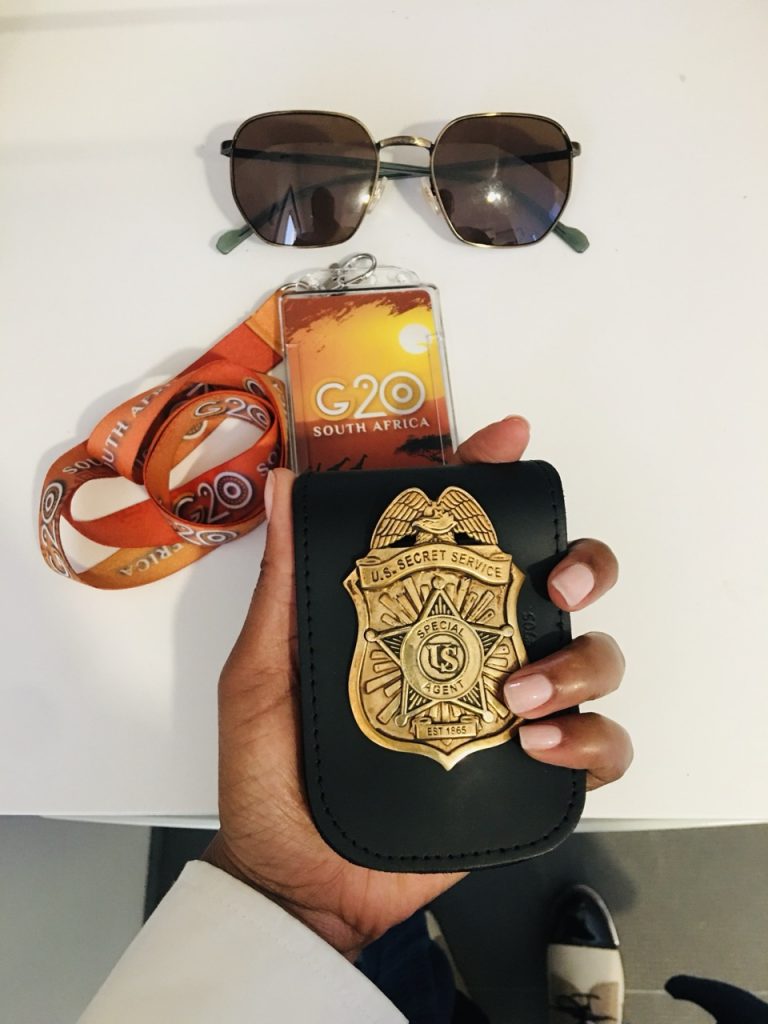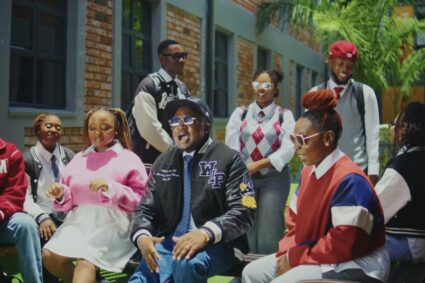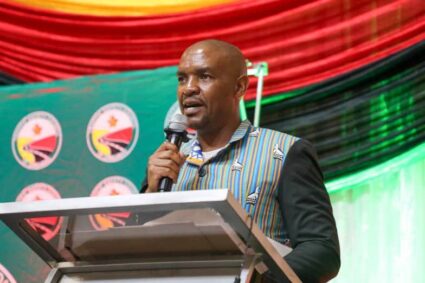
From the vibrant streets of Harare to the dazzling lights of international cinema, Tendaiishe Chitima is a force of nature—a storyteller, performer, and visionary reshaping the narrative of African excellence in film. With a Bachelor of Arts in Film, Media & Writing and Drama from the University of Cape Town, Tendaiishe has brought powerful characters to life across stage, screen, and television.
She first captured global attention with her award-winning role in Zimbabwe’s breakout film Cook Off, a project that not only launched her into the international spotlight but became a cultural milestone for Zimbabwean cinema. Her journey has since expanded into international productions, including the G20 action-thriller alongside Oscar winner Viola Davis.
But Tendaiishe is more than an actress. A retired athlete, published poet, business-savvy creative, and advocate for Africa’s soft power, she is deeply passionate about bridging the arts with technology, media, and entrepreneurship. Her work continues to inspire a new generation of creatives committed to building global African brands.
In this exclusive My Afrika Magazine conversation, we dive into her roots, her artistic process, her bold leap into Hollywood, and her vision for Africa’s creative economy.
MAM: Tendaiishe, your artistic journey has taken you from Zimbabwe to South Africa and now to global screens. What initially drew you to the world of film and storytelling? Was there a defining moment when you knew this was your calling?
TC: It was studying literature in high school that gave me a love for storytelling. We would explore plays, poetry and novels. I enjoyed the subject so much I scored distinctions. A defining moment for me was when I decided to take a drama course in my first year at university. I didn’t want to just analyze the world of the story on a page, I wanted to be in the world physically and embody the characters at play. The rest is history.
MAM: That decision clearly paved the way for many incredible moments—including your breakout role in Cook Off. It must’ve felt like a full-circle moment stepping into that lead. What did the experience mean to you personally?
TC: Cook Off was my first time acting in a feature film. At that point, I had also been trying to land lead roles in South Africa, but it was not a simple task. Connecting with producers back home and then landing the opportunity to lead a feature meant the world to me. It meant that as a Zimbabwean actress I could play a significant role in telling Zimbabwean stories. Acting became a career that helped me explore my identity, community and culture. It helped me embrace where I am from and positioned me as a Zimbabwean actress on the global stage.
MAM: Knowing where you come from is the first point to accepting self, well done!
So, you’ve moved seamlessly across theatre, TV, and film, and each with its own rhythm and energy. Do you approach these mediums differently, or is there one you find yourself most at home in?
TC: I enjoy acting in all its forms. However, I fell in love with drama/theatre first so that’s my “first-love” because of its intimacy with the audience and live performance. In terms of possibilities, I feel that film and TV expand the scope of my work in a profound way. I’ve had the privilege of acting a multitude of diverse characters in different locations and spaces. I approach each one with the same curiosity and intention, ready and willing to give what the character demands.
MAM: Now, your leap into Hollywood with the G20 action-thriller alongside Viola Davis is an incredible milestone. What was that experience like for you as a Zimbabwean actress stepping onto such a massive global stage?
TC: Working on a Hollywood production was life changing! It expanded my thinking on what it means to be a professional actor. Being on a production with almost unlimited resources meant that we could fully recreate the fictional world and immerse ourselves in it – and that does something wonderful to the psyche of an actor! As a Zimbabwean actor, what seemed so far away, came all the way to my doorstep and showed me that it was possible for me too, here on the continent.



MAM: Big dreams coming alive indeed, super proud of you!
Lets talk about your beliefs, you describe yourself as someone who loves “connecting the dots” between art, media, marketing, technology, and business. How do you see these intersections shaping the future of Africa’s creative economy?
TC: Oh, yes. I am a firm believer in the idea that everything is connected. Nothing exists in isolation. I realised early in my career that as African artists and creatives, we tend to focus on the creative sector as an isolated industry, with us weird, wonderful and wild humans who need to express their thoughts and emotions without restriction. Often with laser focus on the craft, and very little emphasis on whether it is sustainable. After studying business, I realised that I wanted to find a way to really connect my art with other skills, ideologies and ways of doing so I could make my own career sustainable. I believe this is the way in which we will build the African creative economy. As a collective, building bridges between art and the systems that are currently driving society, such as business and technology.
MAM: You are the energy you create for others, I love your positivity. So, with a background in both film and business, how important do you think it is for creatives to understand the business side of the arts, especially when building global African brands?
TC: There are valuable lessons in business for artists. To be successful, especially globally one needs to have goals; mission; strategy; organisational, negotiation and marketing skills; time and financial management; and a disciplined productivity schedule among other things. Building global African brands from talent in the film industry will require an infrastructure that supports teams of people with these skills to elevate talent. Most artists navigate their careers with a sense that they’re just “winging it”, but to really break through takes a great deal of intentionality.
MAM: You’ve worked as a TV host, brand ambassador, and even have a history in athletics and literary arts. How do these diverse experiences influence your craft as an actress and storyteller?
TC: They say that life is the greatest teacher of an actor. Having a variety of life experiences enriches my understanding of what it means to be human. Everything that I’ve ever experienced helps me understand and empathise with the characters I play.
MAM: From the stage in The Language Archive to film sets like Just Say Hello and Gonarezhou, your body of work is quite varied. What’s your process when preparing for a role, especially those with deep emotional or cultural significance?
TC: The first thing I do is read the script thoroughly to understand the story well. This helps to truly see what the intentions of the characters are, what is driving them to do what they do, say what they say. Then I also research themes, places and people that are connected to the story before starting to rehearse and prepare to perform.
MAM: Lets take it home, Zimbabwe’s film industry is growing steadily. What are your hopes for the future of Zimbabwean cinema, and how do you see yourself contributing to its global rise? I am hoping that we see impactful and entertaining Zimbabwean productions distributed widely around the world. The prospects are high and truly exciting. I see myself more in front of the camera and behind the scenes in various roles depending on the project.
MAM: What advice would you give to young African artists, particularly women, who are passionate about storytelling but feel limited by access or recognition?
TC: I would encourage them to focus on creating opportunities for themselves, collaborating with talented people at the same level as them so that they sharpen their skills and gain visibility. That experience is also what will help them be so good they can’t be ignored. Aim to be the best at what you do.
MAM: You mentioned valuing authenticity, freedom, and balance. How do you maintain these values in a demanding industry that often pulls creatives in many directions?
TC: Authenticity is non-negotiable for me. I promised myself years ago to always be authentic because of the type of work I do, which requires me to be someone else when on a production. So, to maintain a sense of self, I prioritise being myself and being true to who I am, what I believe in and where I am from. Valuing freedom has demanded that I be confident in my life choices of not working a full-time job. Creativity requires freedom to think, to sit there literally doing nothing sometimes, to just observe, to write, to draw, talk, wal, FEEL. I need the freedom of time to feel. So, even if society applauds full time jobs, valuing freedom has meant going against the grain in that respect. Then lastly, balance for me means taking care of the various aspects of my life that help me stay energised, at peace and productive. So, knowing when to work, then resting or spending time with people and then taking time for myself. It may also look like intentionally making time for family, exercise or prayer and meditation. Ultimately these values are what ground me.
MAM: Lastly, what exciting projects can your fans look forward to next, whether in acting, entrepreneurship, or pan-African creative collaborations?
TC: There’s so much on the horizon! I have a few projects still to be released this year, so please do look out on my socials for updates. But also, having moved back to Zimbabwe, I am looking forward to connecting with creatives and offering products and services that add value to their own creative journeys locally, regionally and globally.


